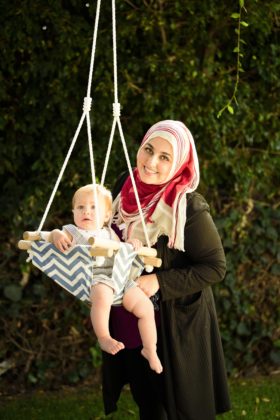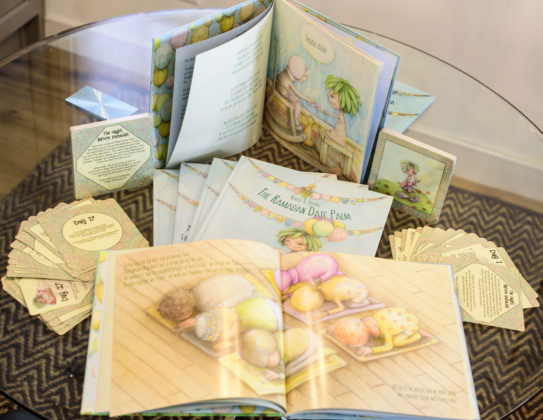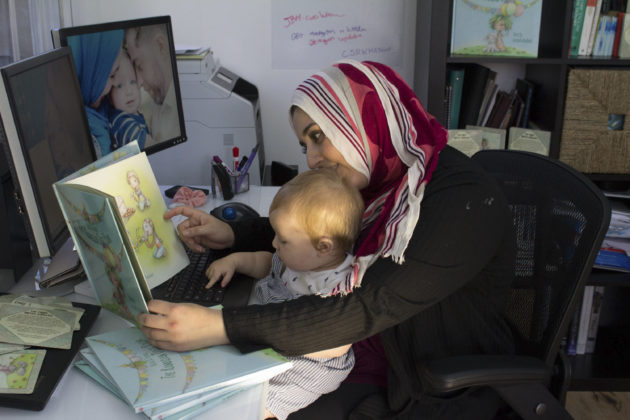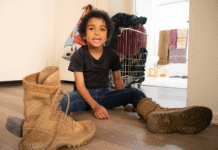Pull up a seat, grab a pen and some paper and listen to this. Yet another meeting where a co worker is discussing a law case.
Now take in the room. The white walls, the floor-to-ceiling glass windows, the 10 foot long table and the multiple chairs that surround you. Make sure you’re taking notes and don’t drift off.
It’s hard to do when you are not as interested as you should be.
Fatemeh Mashouf was doing just that, trying to find interest in the meeting, but couldn’t. She began writing small notes and other information on her note pad. It was during the holiday season and she thought about all the decorations that appeared in and around the city.
Christmas is such a large celebration in America that the underlying amount of people that don’t celebrate it are overlooked.
30-year-old Mashouf struggled to find her Muslim identity in an unknown Western culture the majority of her youth, which lead to the development of a book series.
She thought about how to help children who may struggle with their identity as she did when she was growing up, and that led to Rafiq and Friends, an edutainment series featured on National Public Radio.
“The reason I made Rafiq and Friends and the way that I made Rafiq and Friends is to help little human beings that happen to be Muslim identify with a culture that currently doesn’t exist very prevalently,” Mashouf said. “They are not Muslims from the Middle East, that’s not their identity.”
She started out on an educational path before turning to law, but the idea of helping and teaching others to fight through their crises never left her mind.
Mashouf said that her major struggle was she wasn’t allowed to idolize certain characters unlike her peers. Also, while she in school many holidays were celebrated, but never any of the ones she celebrated at home.
“I just was completely cut off from understanding that. My parents always told me that Santa was fake and that it was ridiculous that I would want him to be real,” Mashouf said. “I just wanted to believe he was real because I wanted to have the level of joy over Christmas that everybody else was able to have.”
With the way her household was, Muslim holidays came and went almost unnoticed except for visiting the mosque.
The process of publication for her book took almost a year because she wanted to it to self publish due to the content and context of the book and materials that came along with it.
“The first book of her series Rafiq and Friends is focused on the celebration of Eid, the last day of Ramadan, which is a major celebration in Muslim culture,” Mashouf said. “It’s almost the equivalent to a Muslim Christmas, yet growing up here, we don’t get the day off school for Eid. We don’t have the malls decorated for Eid. Our teachers aren’t celebrating Eid. So, it was a very isolating holiday, therefore we didn’t get to enjoy the benefit of it.”
Mashouf said that most families that celebrate Eid, do it with their cultural norms, meaning that it’s commemorated in various different ways. She wanted to create a western celebration for the holiday.
Mashouf plans to continue writing more chapters of the book series. The current book includes activity cards that explain what you should be doing each day of Ramadan, the day before and after, and four activities for Eid Al Fitr. It also includes a plush doll of the main character Rafiq and a date plate to be used on the last day of Ramadan.
The Imam of the Islamic Center of Southern California, Asim Buyukosy, said that as an immigrant to the states, he could relate to the way Mashouf and her family may have felt when they moved to America.
“I can understand her situation coming from a homeland and finding yourself in a different environment. There are different people. Everything is new to you like the language and the culture and the religion,” Buyukosy said. “Immediately you are looking for something you can relate to, or something that reminds you of home or something you can attach to.”
He said that being a part of a mosque or islamic center can help people to become more comfortable with themselves. Learning more about the culture, religion and society, if far removed from it is beneficial to fitting in and finding a place where everyone can accept you.
Buyukosy said that woman have a harder time than men when it comes to expressing themselves through their religion, because of traditional garments.
Mashouf started wearing her her headscarf when she was nine. Her parents told her to take it off a year later and come to the conclusion of wearing it or not own her own. She went 10 years without it and at 19 started wearing it again. Now at 30-years-old she’s had it on everyday of the last 11 years.
“If you are a Muslim lady and you are wearing a hijab to cover yourself, you can easily single out the person or stigmatize and say that this is a Muslim person. Me, I’m a Muslim too, but I can fit in and I can look like any other person,” Buyukosy said. “But especially for those who are wearing the religious attire, it’s really difficult.”
She went through a series of events that led her to where she is today. Five years into her law career, she had a son with her husband and her firm allowed her to do more work from home than in the office both during and after her pregnancy.
“I’m a new mom and right now what I find great about my job in reality is that my firm gives me the flexibility to be a mom and to be a lawyer and that one does not have to take over the other,” Mashouf said.
She said that ability to work from home, see her son, meet his need and still achieve what’s necessary for both.
Mashouf said her son and her husband do not look Muslim, so when her family goes out together they face different problems than that of people that all look like a typical Muslim family.
“When we enter certain parts of Los Angeles people will give us a double take. People will think he’s Jewish and I’m Muslim or they think he’s just white and I’m Muslim,” Mashouf said. “It get’s to the point where I can overhear them talking about us in a language they don’t think we understand, but what they don’t realize is my husband does speak Farsi.”
The way the she looked did affect how she dressed for part of her life, but she wasn’t the only one who dealt with finding herself. Her three older siblings and she were never forced to embrace their Muslim culture, but were expected to even though they had the opportunity to find themselves.
“Each one of us had a very different experience in navigating our Muslimness,” Mashouf said. “Some of us understood it to be a part of who we are and some of us rejected it entirely and a lot of it is because we could not find the balance between who our parents wanted us to be and who we wanted to be just because it was easier.”
Mashouf attended the University of California, San Diego with a major in English and a minor in Education, set on becoming a teacher, when her mosque was targeted by the neighbors in the area.
Mashouf said they wanted them out because they didn’t like that there were Muslims in the area and used their permits as an excuse. The permits were said to be for educational use and not religious use and the courts ruled in favor of the neighbors.
“I felt very frustrated in the process of being in a courtroom and not really understanding and being able to assist the mosque that I cared so much about, so I kind of redirected myself at that point to pursue law,” Mashouf said.
She attend the University of California, Hastings for law school and became bar licensed soon after she graduated in 2012.
“I’ve always felt like I had to be my own strongest advocate and understanding the law meant that I had the opportunity to do that,” Mashouf said. “Without understanding the law and a lot of circumstances I just didn’t have the information I needed to advocate for myself, my community, my family and things that I care about.”
While in law school Mashouf said she was exposed to many types of law and felt that employment litigation was the best fit for her.
“Employment law had the right balance of personal and not so personal. Because with family law or criminal law I would take the emotions home in a different way and it would weigh me down in a way I wasn’t prepared to allow my work to do for me,” Mashouf said. “So I felt like the emotional burden in those areas was so much, but I didn’t want to be disconnected from people either.”
Shahram Samie, an attorney at Littler Mendelson, met Mashouf while she was still a law student. They had a mutual friend and ended up at the same dinner party.
“Fatemeh is a very driven person and you see that in terms of her going to law school and getting a job at this law firm,” Samie said. “On top of that she has a family and she writes a book and has other endeavours that she handles and does and that’s just really impressive.”
Mashouf’s work ethics and drive isn’t mediocre to those she works with, but that doesn’t stop others around her from treating her in cliche ways.
Mashouf said that she has had to endure many types of racism and xenophobia and she is going to help tear down the expectations and stereotypes of others.
“As a Muslim woman, whether it’s trying to navigate my own culture or whether it’s people outside my own culture trying to navigate me and figure out who I am, it’s constantly a challenge.” Mashouf said.






